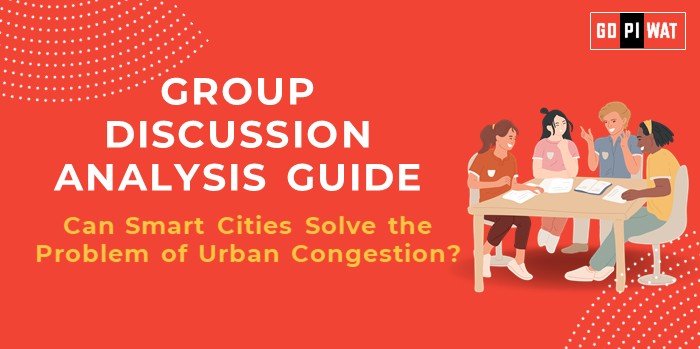📋 Group Discussion Analysis Guide: Can Smart Cities Solve the Problem of Urban Congestion?
🌐 Introduction to the Topic
- Opening Context: Urban congestion is a critical challenge faced by cities globally, with increasing population density leading to traffic snarls, pollution, and inefficiencies. Smart cities, leveraging technology and innovation, aim to address these challenges through data-driven solutions.
- Topic Background: The concept of smart cities emerged in the early 2000s as a response to rapid urbanization. By integrating IoT, AI, and sustainable urban planning, these cities promise efficient infrastructure, better mobility, and an enhanced quality of life.
📊 Quick Facts and Key Statistics
- 🌍 Urban Population Growth: Over 68% of the global population will live in cities by 2050 (UN 2023).
- 💰 Smart Cities Spending: $189 billion invested globally in smart city technologies in 2023 (IDC).
- ⏳ Congestion Costs: Traffic congestion costs $87 billion annually in lost productivity in the U.S. alone (INRIX 2023).
- 🇮🇳 India’s Smart Cities Mission: Launched in 2015, targeting 100 cities with an investment of ₹2.05 lakh crore.
👥 Stakeholders and Their Roles
- 🏛️ Governments: Implementing policies and funding smart city initiatives.
- 💻 Tech Companies: Developing IoT and AI technologies for urban management.
- 🏘️ Urban Residents: Adopting smart solutions and sustainable practices.
- 🌍 International Organizations: Facilitating knowledge-sharing and funding urban development projects.
🏆 Achievements and Challenges
✨ Achievements
- Improved Traffic Management: Smart sensors in Singapore have reduced congestion by 15%.
- Real-Time Monitoring: Barcelona uses IoT-enabled parking systems, cutting search times by 30%.
- Public Transport Integration: London’s Oyster Card system efficiently integrates all public transport modes.
⚠️ Challenges
- High Costs: Smart city infrastructure is capital-intensive.
- Digital Divide: Limited access to technology in underprivileged areas.
- Data Privacy Concerns: Rising use of surveillance and personal data without robust regulations.
🌍 Global Comparisons
- 🇸🇬 Singapore: Leads in smart urban mobility, leveraging AI for traffic optimization.
- 🇳🇱 Netherlands: Smart bike-sharing programs reduce congestion in Amsterdam.
📖 Case Study
Pune Smart City Initiative: Implemented Intelligent Traffic Management Systems (ITMS), improving traffic flow and reducing commute times by 12%.
📚 Structured Arguments for Discussion
- 💪 Supporting Stance: “Smart cities provide data-driven solutions that reduce congestion, enhance mobility, and improve urban living standards.”
- ❌ Opposing Stance: “High costs and digital divides make smart cities impractical for addressing congestion in developing countries.”
- ⚖️ Balanced Perspective: “Smart cities offer potential solutions, but their success depends on equitable implementation and addressing socioeconomic barriers.”
💡 Effective Discussion Approaches
- 📊 Opening Approaches:
- Data-driven: “With urban congestion costing the U.S. $87 billion annually, smart city solutions are not just desirable but essential.”
- Comparative: “While Singapore excels in smart traffic management, most developing countries struggle with implementation.”
- 🎯 Counter-Argument Handling:
- “While costly, smart city projects yield long-term economic and environmental benefits.”
- “Addressing the digital divide through affordable technologies can ensure inclusivity.”
🔍 Strategic Analysis of Strengths and Weaknesses
- ✅ Strengths: Data-driven optimization, environmental benefits, and efficient resource management.
- ❌ Weaknesses: High implementation costs and potential privacy concerns.
- 🚀 Opportunities: Integration with green technologies, public-private partnerships.
- ⚠️ Threats: Cybersecurity risks, socioeconomic inequalities.
🎓 Connecting with B-School Applications
- 📌 Real-World Applications: Urban planning strategies, public policy frameworks, and sustainability case studies.
- ❓ Sample Interview Questions:
- “How can smart cities balance technology with inclusivity?”
- “What are the challenges of funding large-scale smart city initiatives?”
- 📘 Insights for Students: Explore the role of technology in urban management and its impact on economic and social policies.


